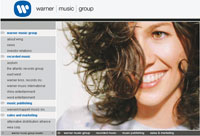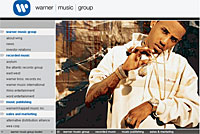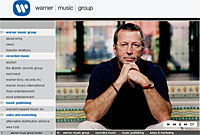 Warner Music Group has announced a new digital music distribution mechanism based on downloads rather than physical media like CDs.
Warner Music Group has announced a new digital music distribution mechanism based on downloads rather than physical media like CDs.
Labelling the new mechanism an “e-label”, Edgar Bronfman Jr., Warner Music’s chairman and CEO, told the Progress & Freedom Foundation conference that they were “trying to experiment with a new business model” to “see where it goes.”
With music download services raking in the cash and sales of CDs slipping, Bronfman proposed that e-label artists could churn out music in clusters of three songs every few months rather than a CD every few years.
 With far lower production costs, Bronfman claimed that the e-label will give recording artists a “supportive, lower-risk environment” (I think this means “less cash from the record company”) without as much pressure for huge commercial hits – something that could benefit artists with a more “selective audience”.
With far lower production costs, Bronfman claimed that the e-label will give recording artists a “supportive, lower-risk environment” (I think this means “less cash from the record company”) without as much pressure for huge commercial hits – something that could benefit artists with a more “selective audience”.
Interestingly, Bronfman added that artists signed to the e-label will retain copyright and ownership of their master recordings.
“An artist is not required to have enough material for an album, only just enough to excite our ears,” Bronfman said at the conference.
Warming up to the theme of the relationship between technology companies and the entertainment industry, Bronfman reminded attendees at the conference that recorded music has long been influenced by the distribution technologies available – pop songs were traditionally restricted to around 3 minutes because that’s as much music as a 45 rpm record could hold, he said.
Hastily compensating for his brief bout of nostalgia, Bronfman let the gathered suits know that he was a 21st century guy, unleashing two buzzword laden bon mots in quick succession: “Technology shapes music;” “Music drives technology adoption.”
 Bronfman called on the technology industry to work on digital rights management (DRM) standards, arguing that compulsory licensing – with support from P-to-P vendors – would set a price for downloaded music while forcing music companies to make their products available online to P-to-P users.
Bronfman called on the technology industry to work on digital rights management (DRM) standards, arguing that compulsory licensing – with support from P-to-P vendors – would set a price for downloaded music while forcing music companies to make their products available online to P-to-P users.
“As a content company, we quite naturally want devices out there that permit consumers to seamlessly access our music without having to worry about the compatibility of operating systems or DRMs,” he said.
“The consumers’ digital music experience should be as seamless and rewarding as possible, but we would be hypocrites to suggest that the government should force interoperability standards on devices while at the same time insisting there is no need for compulsory licensing.”
The latest figures from the International Federation of the Phonographic Industry, reveal that around 180 million songs were sold online in the first half of 2005, up from 57 million in the same period last year.